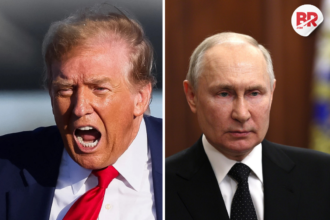
When the referee takes sides, the whole game’s rigged—and your wallet’s on the line.
Donald Trump’s feud with the Federal Reserve isn’t just political theater—it could ripple through your wallet.
During his presidency, Trump’s Fed feud caused tremors on Wall Street and raised serious questions about the independence of America’s central bank. The drama may seem far from your daily routine, but if you have a mortgage, a retirement plan, or even a savings account, it matters more than you think.

What’s Really at Stake?
The Federal Reserve—aka “the Fed”—sets interest rates, controls inflation, and aims to keep the economy stable. It’s designed to be independent from political influence for a reason: so it can make tough decisions based on economic data, not political pressure.
But Trump? He didn’t like playing by those rules.
From 2018 to 2020, the former president repeatedly slammed the Fed for not cutting rates fast enough, even calling out then-Chair Jerome Powell on Twitter. At one point, he said the Fed had “gone crazy” and questioned whether Powell was a “bigger enemy” than China’s Xi Jinping.
Yes, that happened.
Also Read: Trump Wants to Fire Fed Chair Powell—What Happens If a President Actually Tries?
Why the Fed’s Independence Matters
So why does all this back-and-forth matter to everyday people?
Because when the Fed is influenced by politics, it may stop making long-term decisions and start chasing short-term wins. That could lead to:
- Higher inflation or financial bubbles
- Instability in loans, mortgages, and savings
- Erosion of investor trust and market credibility
Think of the Fed like the referee in a football game. When the referee starts playing for one team, the whole match gets rigged—and no one trusts the game anymore.
Market Meltdown? Not Quite—But Close
Trump’s criticism wasn’t just noise. Markets listened.
- Stock Market Volatility: His anti-Fed tweets were often followed by sudden market swings.
- Currency Jitters: The dollar weakened when traders feared the Fed might cave to pressure.
- Bond Market Uncertainty: Bond yields jumped and dipped as investors tried to guess what would happen next.
These aren’t abstract numbers. They affect everything from your 401(k) to your car loan interest rate.
A study by the Federal Reserve Bank of New York found that Trump’s Fed comments increased uncertainty in financial markets.
Also Read: How Trump Tariffs Are Pushing Companies to Get Creative with Billion-Dollar Deals
A Dangerous Precedent?
Historically, U.S. presidents avoided direct criticism of the Fed. Even Ronald Reagan, known for his strong opinions, kept his views behind closed doors.
But Trump broke that tradition—and many fear that precedent could pave the way for future presidents to do the same.
If the Fed becomes just another political tool, its power to steer the economy could be weakened when we need it most—during crises.
What Can Be Done?
Presidents can appoint Fed chairs, but once those chairs are confirmed, they’re supposed to operate independently. Safeguarding that autonomy is vital.
As voters and citizens, understanding this balance is key. Central bank independence might not trend on TikTok, but it impacts everything from inflation to job growth.
Also Read: Trump turns Covid info website into lab leak promotion page












